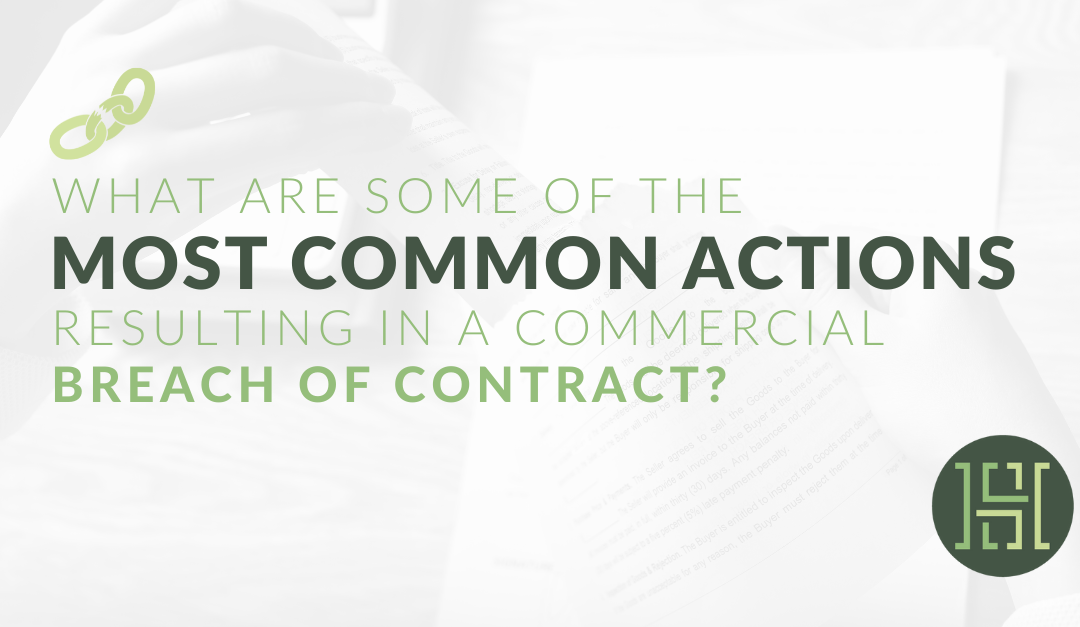One of the most common reasons a business may bring a lawsuit against another company is because of a breach of contract. Business-to-business contracts must follow a set of rules and regulations to ensure both parties will uphold their end without issue. A contract violation can happen from a wide variety of actions taken or not taken by either party involved. However, there are some common activities that frequently result in a commercial breach of contract between businesses.
What is Considered a Breach of Contract?
If either party believes there was a breach of contract somehow, it could be crucial to understand what causes one to begin with. In most cases, a commercial breach of contract entails one party failing to execute in full faith their required actions.
When a clause is not fulfilled or done according to the contract, there could be a breach of contract on their side, leaving the other party suffering. This party may lose money, be given improper services, or have to dissolve the contract altogether.
An Oral Contract
For many, a simple handshake and oral agreement may be enough to get a project or undertaking rolling. However, an oral agreement can be easily misunderstood, disputed, and ultimately hard to prove, in the eyes of the other party that agreed. Often, a certain side will choose not to fulfill their side of the oral contract, and the steps to take afterward are much less cut and dry than if it was a written contract.
No matter what or who a business decides to work with, a written contract is the best way to go. This ensures that both parties are kept accountable and can be brought into question if the situation arises.
What Type of Breach?
When a breach of contract occurs, there are two categories that the breach can fall under. This designation can change the outcome and resolution for both parties involved. To determine if an action is considered a breach, it may be necessary to decide on the nature of the breach.
The two types of contract violations are considered material and immaterial. A material breach of contract is when the disputed issue consists of clauses essential to the contract itself. This could be a specific promise made by one party such as a renovation, or additional payments. A material breach will allow the suffering party to seek damages, however, the contract is unable to be resolved and can not continue afterward unless there is a full rewrite or a new agreement made.
The next type of breach is immaterial. If the breach of contract is said to be immaterial, the issue in question is not essential or pertinent to the situation. An immaterial breach is distinguished from a material breach by the fact that the contract’s value will not be affected if a clause is not kept. This could lead to a resolution or a slight modification within the contract.
Failure to Fulfill Obligations
One of the most common actions that are considered a breach of contract is when one party does not fulfill their end of the agreement. No matter whether they notified the other party beforehand or stopped responding to requests or questions, these are all violations.
Occasionally, if the party that has suffered the breach can prove that there was some sort of financial loss, legal action can be more easily justified. Legal action can also be taken before any breach of contract as well. If one side of the deal comes forward and claims they cannot fulfill what is asked of them, following steps can be taken towards them, such as a change within the contract.
Failure to Make Payment
A breach of contract can occur if a party neglects to make the required payments, or the right amount, as stated in the agreement. Once again, this scenario can change depending on if there was communication beforehand between parties.
Failure to Bring Proper Goods
A commercial contract may have requests for certain goods, products, or services provided by either party. If the proper goods and services are not delivered, or the goods and services are not the quality that was asked for, this would be considered a breach of contract and could lead to litigation.
Remedies to a Breach of Contract
When there is a breach of the contract, the suffering party is entitled to relief or remedies. Examples of remedies could be damages, specific performance adaptations, cancellations, or restoration.
If you want to try to avoid a commercial breach of the contract altogether, there are some precautions to take into account when creating the deal. The first of which is to draft all possible agreements. This allows both parties to have the opportunity to see what will work best in the circumstance, so no one is placed in a bad position where they can not perform adequately. A written contract can also help against any false promises or oral agreement disputes. By writing clauses and specific information within the contract, you can ensure that you and the other party is getting what they need, and there is no possible wiggle room. If you have any questions about creating a sound contract or if there has been a breach of contract and you are unsure what your next actions should be, please feel free to reach out to the Hunter Law Group team to discuss your best options.

